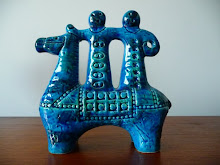Springtime for Hitler
Did anyone watch Hitler, The Rise of Evil earlier this week? The miniseries depicted Hitler's rise to power up to 1933. In doing so, it offered an array of explanations for Hitler's adult character and actions: an overbearing father, an overindulgent mother, a latent fear of women, an early xenophobic streak brought on by his need to overcompensate, as an Austrian, for his geographical displacement from Germany. The show adopted a general catch-all policy, citing anything and everything as potential reasons for Hitler's monstrosity. This policy also extended to the choice of casting. The transatlantic cast contained the incongruous accents of Robert Carlyle (of Full Monty fame), Stockard Channing (Grease) and Liev Schreiber (most recently in a NY Central Park production of Henry V).
The miniseries has just received an Emmy nomination. I have no idea why. Never mind the suggestive title, which, for my money, is all too reminiscent of Up, Pompeii. (Or, for that matter, the Australian documentary on Russel Crowe's career, Behind The Gladiator.) The problem was the (mis)casting of Robert Carlyle. Watching the always-agreeable and congenial Carlyle bark, hiss and rant -- as though he were some stock villain on Scooby Doo -- was a little like watching me play football: simultaneously awful and hilarious.
I've come to the conclusion that it's impossible at this point in time to depict Hitler in TV, film, or stage without being -- intentionally or not -- funny. Indeed, impersonations and parodies of Hitler in things like The Goodies and Indiana Jones and The Last Crusade have been so influential in his dramatization that it's become virtually impossible to portray him and appear anything other than patently, woefully artificial -- more like an impersonation of a prior impersonation rather than of Hitler himself.
For what it's worth, the most convincing, because deliberately irreverent, portrayal of Hitler I've ever seen or heard comes from Mel Brooks' musical, The Producers. The musical climaxes, so to speak, with a sung-through travesty called 'Springtime for Hitler', in which the camp and theatrical Adolf, whose rise to the top of Reichstag is depicted as having more in common with a beauty pageant than a political coup, cheerfully describes himself as "the German Ethel Merman". Who's the impersonator now?
skip to main |
skip to sidebar
*F.O.P. from London via India and Hong Kong
About Me
Watched
- Before the Rain 3/5
- Burn After Reading 4/5
- Curious Case of Benjamin Button 3.5/5
- Milk 5/5
- Slumdog Millionaire 4.5/5
- Vicky Cristina Barcelona 4/5
- Yes Man 3.5/5
Reading
- Habitus issue 02 January - March 09
- Unaccustomed Earth by Jhumpa Lahiri
- What Colour is Your Parachute by Richard Nelson Bolles
- What Next? Surviving the Twenty-First Century by Chris Patten
Archives
-
▼
2003
(90)
-
▼
July
(18)
- Alexander the Great Gay Hero?
- Divas on the Move
- Hairy truths
- Australian Idol
- Gay it Forward
- Servius 4 Maximus
- Tourism and its Discontents
- You Know who you are
- Send in the Clones
- The Last Supper
- 'Crazy if you love it'
- Springtime for Hitler
- Girl, Interrupted
- Chris Meloni and papa, can you hear me?
- Doppelganger
- The Cross
- Hong Kong Handover
- Sabbatical I received my exam results last Wednesd...
-
▼
July
(18)

No comments:
Post a Comment